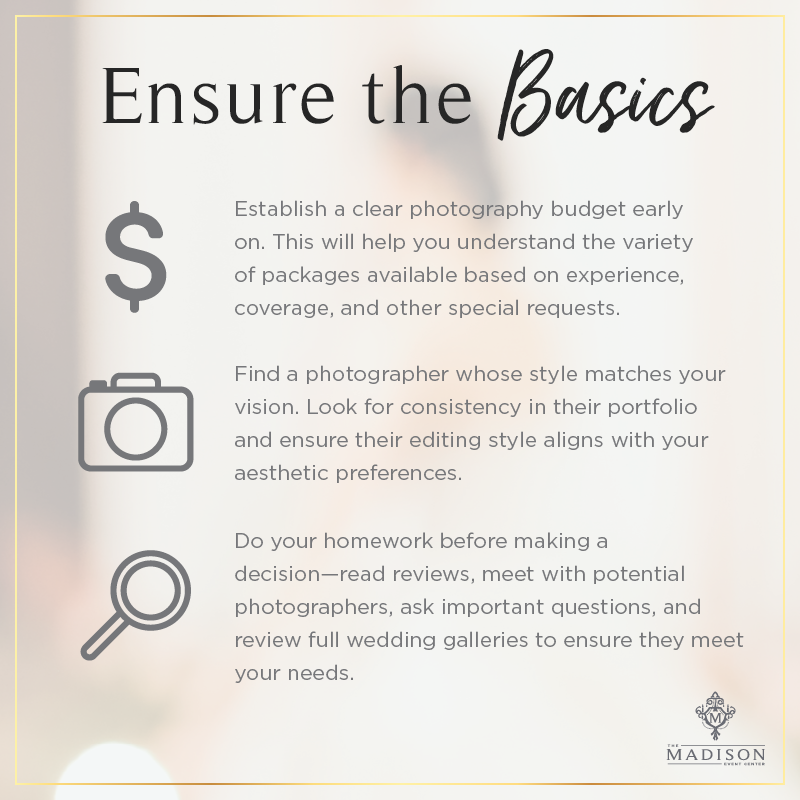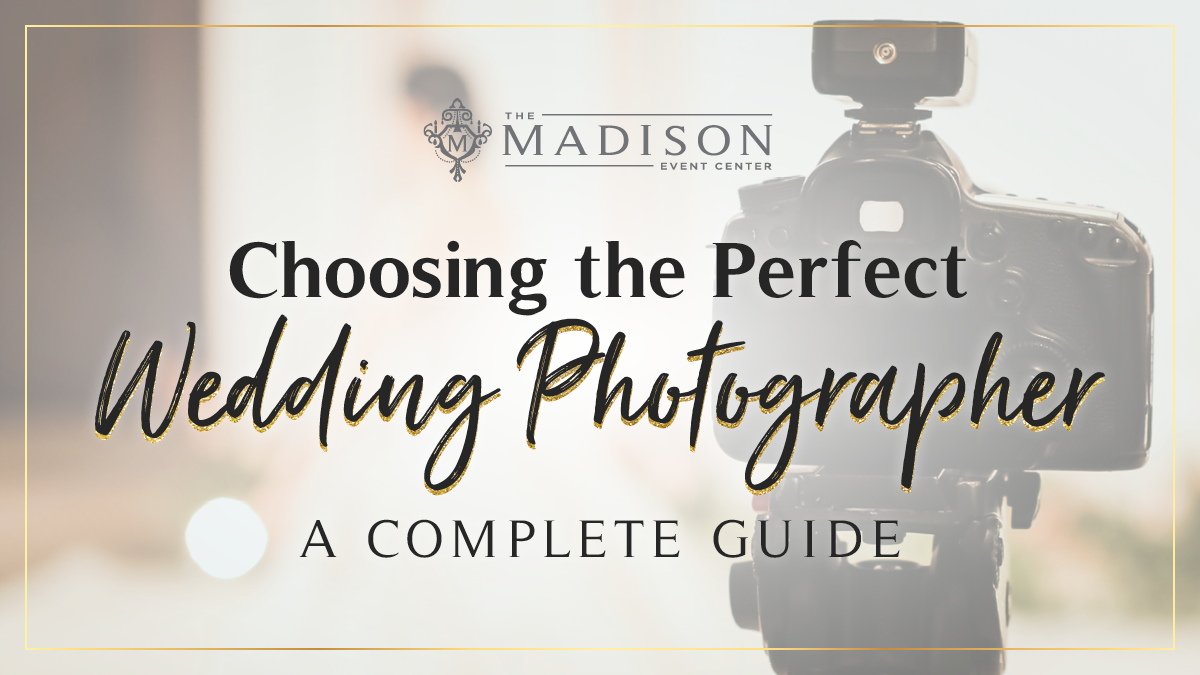Choosing the ideal wedding photographer means understanding your vision, Selecting the ideal wedding photographer is a key decision in ensuring your big day is beautifully documented. This guide will walk you through the essential steps to find the right photographer who aligns with your vision, meets your budget, and has the expertise to capture unforgettable moments. By the end, you’ll have the tools to confidently choose a photographer who will preserve your memories for a lifetime.

Setting Your Wedding Photography Budget
Wedding photography is one of the most important investments you’ll make in your wedding planning. On average, couples spend between $2,500 and $4,000, but prices can range widely—from $500 for student photographers to over $10,000 for top-tier professionals.
Typically, wedding photography accounts for 10-15% of your overall wedding budget. The price will depend on factors like the photographer’s experience, how many hours of coverage you need, and whether multiple photographers are required. Additional costs can include travel fees, extra time, or special services such as drone photography or engagement sessions.
Make sure to discuss the full scope of services upfront, including what’s included in the package and any extra fees, to avoid surprises later.
Understanding Photography Styles
One of the most important steps in choosing a photographer is understanding the different photography styles available. Here are some popular options:
- Photojournalistic: Unposed, spontaneous moments that tell the story of your day.
- Traditional: Posed, formal shots with a focus on classic compositions.
- Fine Art: Soft, ethereal images with a romantic, film-like quality.
Knowing which style resonates with you will help guide your search. Whether you want candid moments or posed portraits, make sure the photographer’s portfolio matches your desired aesthetic.
The Impact of Editing Styles
A photographer’s editing style plays a major role in how your photos will look. Some photographers favor light, airy edits, while others may opt for a darker, moodier feel. Consider what appeals to you most and look for a photographer whose editing style matches your personal taste. To get a true sense of their editing approach, ask to see complete wedding galleries rather than just a curated selection.
Consistency of a Photographer’s Work
A strong portfolio is vital, but it’s also important to evaluate a photographer’s consistency. Review a variety of their photos to ensure they maintain the same level of quality, lighting, and composition throughout their work. A photographer with consistent editing and a defined style will provide you with a cohesive collection of images that reflect your wedding day beautifully.
The Importance of Reviews and Testimonials
Reading reviews from past clients is one of the best ways to understand a photographer’s work ethic and the overall experience they provide. Look for testimonials that mention the photographer’s communication skills, reliability, and ability to capture meaningful moments.
Look for feedback on how well the photographer collaborates, adapts to the couple’s needs, and the quality of the final images. Positive testimonials can give you insight into how the photographer interacts with clients and handles special requests, making it easier to determine if they’re a good fit for your wedding.
Before making a final decision, arrange a meet-and-greet with potential photographers. This is your opportunity to assess whether their personality matches your own and if you feel comfortable around them. Your photographer will be with you throughout the day, so it’s important that you can communicate effectively and feel at ease with them.
Discuss your photography preferences and go over your wedding timeline during this meeting. A good photographer will offer suggestions and be open to your ideas. This is also the perfect time to ask about their process, how they work under different conditions, and any other details you want to clarify.
Key Questions to Ask your Wedding Photographer
When meeting with potential photographers, ask the following questions to ensure you’re getting the service and experience you expect:
- How much experience do you have with weddings?
- Can you provide a full wedding gallery from a recent event?
- What backup plans do you have for equipment failure or other emergencies?
- How do you approach capturing key moments like the ceremony and reception?
- Do you offer packages that include engagement sessions or albums?
- What rights do we have to the photos after the wedding?
These questions help you gauge the photographer’s professionalism, experience, and ability to handle unexpected situations.
Backup Plans and Equipment
It’s important to ensure your photographer has backup plans for both equipment and any unforeseen issues. A professional photographer should have backup cameras, lenses, memory cards, and other gear to prevent technical failures from disrupting your day. Additionally, make sure they have contingency plans in place in case of emergencies, such as illness or other unforeseen events.
Image Rights and Usage
Before signing a contract, clarify the rights you will have to your wedding images. Some photographers retain copyright, while others offer full ownership or licensing options. You should also confirm whether you’re allowed to post images on social media or use them for promotional purposes. A clear agreement on image usage rights is essential to avoid confusion down the road.

Once you’ve narrowed down your options, take a moment to reflect on everything you’ve learned. Does the photographer’s portfolio resonate with you? Have they communicated clearly and professionally? Are they within your budget? Trust your instincts and choose the photographer who you believe will best capture your wedding day.
Social Media: A Window into Their Work
Social media platforms, especially Instagram, can offer valuable insights into a photographer’s style and recent work. Reviewing their posts and interactions can give you a better sense of their personality and professionalism. A well-curated feed and positive client interaction can signal a photographer who is engaged and committed to their craft.
Reviewing Full Wedding Galleries
Before finalizing your decision, request to see a complete wedding gallery. Full galleries provide a comprehensive view of the photographer’s work and give you a better sense of how they capture a wedding day in its entirety. Look for a mix of candid moments, posed portraits, and key moments like the ceremony, vows, and first dance. This will help you gauge their consistency and skill across various wedding elements.
Trust Your Gut
In the end, trust your instincts when choosing your wedding photographer. It’s not just about their portfolio or pricing—it’s about the connection you share. You want a photographer who understands your vision and is dedicated to capturing your love story in a way that feels authentic and meaningful.
Booking Your Photographer
After making your decision, confirm the booking by signing a contract and paying a retainer. The contract should include details about the services, pricing, image rights, and cancellation policies. Ensure all your questions have been answered and that you’re comfortable with the terms.
Summary
Choosing the right photographer for your wedding is a decision that requires careful thought and planning. Establish your budget, review portfolios, and meet with potential photographers to discuss your vision and expectations. Make sure to ask important questions, clarify image rights, and review full galleries to ensure consistency and style align with your preferences. Once you’re confident in your choice, book your photographer and prepare for a seamless experience on your big day. Trust your intuition, and you’ll have a photographer who will capture the magic of your wedding day for years to come.
Frequently Asked Questions
Is it OK to negotiate with a wedding photographer?
Certainly, engaging in negotiation with a wedding photographer is acceptable. It’s essential to approach the matter both tactfully and with respect. If you make your request courteously, many wedding photographers might be open to accommodating your needs partially.
What is the average amount to spend on a wedding photographer?
Typically, securing the services of a proficient wedding photographer for your nuptials in the United States may set you back anywhere between $1,000 and $4,000, although this figure can climb even higher. When selecting a photographer for your wedding, weighing your financial plan and the caliber of the photographer’s work is critical.
What factors affect the cost of wedding photography?
Factors like the experience level of photographers, the length of coverage time, how many photographers are hired, and what is bundled in the package—for instance, engagement sessions—all play a role in determining the overall cost of wedding photography.
Why is consistency important in a photographer’s work?
Maintaining a uniform style and level of quality in a photographer’s work is crucial for narrating an integrated story and setting definite expectations for clients. A photographer who sustains consistency earns their audience’s trust and enhances their credibility.
What should I ask about backup plans and equipment?
Ensure to inquire regarding their strategies for unforeseen circumstances and the availability of backup equipment, which will guarantee a seamless photography experience during your wedding.


